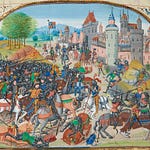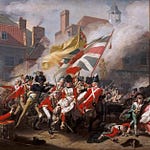Originally published on May 8, 2023 (Episode 315)
Introduction
For centuries, Londoners encountered food not just in kitchens or taverns but on the streets. From shellfish and fried fish to baked potatoes, pies, fruit, and milk, street vendors—or hawkers, to use the London term—offered quick, cheap sustenance to a rapidly growing city. Hawkers were often the poorest and least respectable members of society, yet their trade was indispensable in feeding the metropolis.
In his new book Street Food: Hawkers and the History of London (Oxford, 2023), Charlie Taverner chronicles the lives of these vendors over three centuries. He follows them with baskets and carts through London’s lanes and markets, reconstructing how their work both reflected and shaped the process of urbanization. This is more than food history: it is urban history seen from the street level, where ordinary men, women, and children kept a great city fed.
About the Guest
Charlie Taverner is Research Fellow at Trinity College Dublin. A social historian of cities and food, he was formerly a business and agricultural journalist. He grew up on a dairy farm in Devon. Street Food is his first book.
For Further Investigation
Charlie Taverner, Street Food: Hawkers and the History of London (Oxford, 2023)
Episode 133: M
David Edgerton, The Shock of the Old: Technology and Global History since 1900
“The Largest Dairy in the Kingdom: Laycock’s Dairy”—not the Islington we know
Related Episodes
For more on the complexities of the city, see “Mad Dogs and Other New Yorkers”
On the broader history of food Rachel Laudan
💬 Listen & Discuss
How do food sellers shape the life of a city? Can we see today’s food trucks, coffee carts, and street markets as heirs to early modern hawkers? How are they different? Share this delicious podcast with the foodies in your life.











